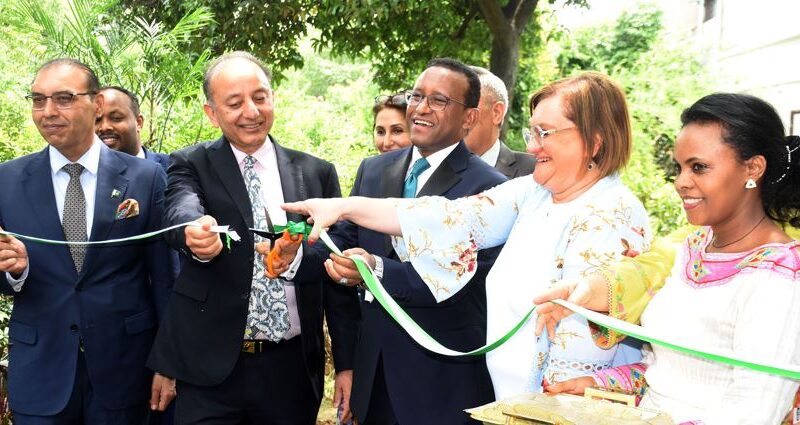Pakistan joins Ethiopia in historic tree planting initiative
Staff Report
ISLAMABAD: In a remarkable display of international cooperation, Pakistan has joined Ethiopia in planting 700 million seedlings in one day under the “Renewal Through Planting” campaign, launched as part of the Green Legacy Initiative of Ethiopian Prime Minister Dr Abiy Ahmed.
A joint plantation drive and media briefing were held at the Ethiopian Embassy in Islamabad to mark Pakistan’s participation, attended by dignitaries including diplomatic corps, government officials, parliamentarians, business leaders, religious figures, youth, media and civil society representatives.
Dr Musadik Malik, Federal Minister for Climate Change and Environmental Coordination, graced the event as the chief guest, while Hamid Asghar Khan, Additional Secretary (Africa) from Pakistan’s Ministry of Foreign Affairs, attended as the guest of honor.
The Ambassador of Ethiopia to Pakistan, Dr Jemal Beker, highlighted the Green Legacy Initiative, launched in 2019, as a vital effort to restore ecological balance, reduce carbon emissions and soil erosion, and promote food security and sustainable development.
He emphasized that Pakistan’s participation underscores its commitment to strengthening ties with Ethiopia and sends a powerful message that Pakistan is not alone in its fight against climate change.
A high-level delegation of Ethiopian officials and climate experts is set to visit Pakistan soon to participate in “Green Dialogues” and plantation campaigns across the country.
The Federal Minister commended the Ambassador for his exceptional efforts in promoting green behaviors and values throughout Pakistan, lauding Prime Minister Dr Abiy Ahmed’s visionary leadership in advancing the international climate agenda.
Federal Minister for Climate Change and Environmental Coordination, Dr. Musadik Malik, on Thursday said climate action must be rooted in justice, warning that environmental degradation amounts to intergenerational theft.
He made the remarks while addressing a tree plantation event hosted by the Ethiopian Embassy in Islamabad as part of Ethiopia’s Green Legacy Programme.
The event, led by Ethiopian Ambassador Dr. Jemal Beker Abdula, is part of Ethiopia’s ambitious campaign to plant 700 million trees globally to restore degraded ecosystems and curb greenhouse gas emissions. As part of the initiative, seedlings will be planted across Pakistan, marking a significant moment of climate diplomacy and cooperation between the two developing nations.
“Climate change is not just a scientific issue—it is a matter of justice,” Dr. Malik said. “When we pollute the environment, we are committing an injustice that will echo across generations. If we do not act now, nature will respond in ways we cannot undo.”
The Federal Minister also announced a new nationwide plantation campaign set to launch in August. The initiative will distribute free saplings to the public to promote reforestation, strengthen Pakistan’s climate resilience, and engage citizens in environmental stewardship.
During the event, Ambassador Jemal Beker highlighted the significance of the Green Legacy Initiative, describing it as a cornerstone of Ethiopia’s climate policy. “This is not just a campaign about trees, but about shared responsibility,” he said. “Pakistan is not alone in the fight against climate change. We are partners.”
The Ambassador invited Dr. Malik to attend the upcoming Africa Climate Summit in Ethiopia this September, emphasizing the importance of South-South cooperation in addressing the global climate emergency.
Dr. Malik praised Ethiopia’s efforts as a model for proactive climate leadership. “Ethiopia’s example shows that persistence and national unity can drive real ecological change. Pakistan has much to learn and share in this journey,” he said.
The plantation drive also served to highlight the broader environmental challenges facing both countries, including deforestation, rising temperatures, and declining biodiversity.
Officials from both sides reaffirmed their shared commitment to reforestation, climate resilience, and international collaboration to protect the planet.
This diplomatic and ecological partnership reflects a growing trend among developing nations to take ownership of climate solutions, despite contributing the least to global emissions.
The Ministry of Climate Change’s upcoming plantation campaign is expected to engage millions of Pakistanis, with the dual goal of ecological restoration and climate awareness. It comes at a time when the country continues to face the devastating consequences of erratic weather patterns, floods, and water scarcity—challenges worsened by global warming.
As Dr. Malik put it, “When we deny the next generation the beauty of fireflies or the wonder of a starry night, we are not just harming the planet—we are harming humanity.”




